Fiat Panda vs Hyundai Inster – Which car suits you better?
Costs and Efficiency:
Price and efficiency are key factors when choosing a car – and this is often where the real differences emerge.
Fiat Panda has a decisively advantage in terms of price – it starts at 14100 £, while the Hyundai Inster costs 20500 £. That’s a price difference of around 6351 £.
Engine and Performance:
Power, torque and acceleration are the classic benchmarks for car enthusiasts – and here, some clear differences start to show.
When it comes to engine power, the Hyundai Inster has a noticeable edge – offering 115 HP compared to 70 HP. That’s roughly 45 HP more horsepower.
In acceleration from 0 to 100 km/h, the Hyundai Inster is distinct quicker – completing the sprint in 10.60 s, while the Fiat Panda takes 13.90 s. That’s about 3.30 s faster.
In terms of top speed, the Fiat Panda performs barely noticeable better – reaching 164 km/h, while the Hyundai Inster tops out at 150 km/h. The difference is around 14 km/h.
There’s also a difference in torque: Hyundai Inster pulls noticeable stronger with 147 Nm compared to 92 Nm. That’s about 55 Nm difference.
Space and Everyday Use:
Whether family car or daily driver – which one offers more room, flexibility and comfort?
Both vehicles offer seating for 4 people.
In curb weight, Fiat Panda is distinct lighter – 1055 kg compared to 1380 kg. The difference is around 325 kg.
In terms of boot space, the Hyundai Inster offers to a small extent more room – 280 L compared to 225 L. That’s a difference of about 55 L.
In maximum load capacity, the Hyundai Inster performs slightly better – up to 1059 L, which is about 189 L more than the Fiat Panda.
When it comes to payload, Fiat Panda barely noticeable takes the win – 365 kg compared to 357 kg. That’s a difference of about 8 kg.
Who comes out on top?
Overall, the Hyundai Inster shows itself to be leaves the rival little chance and secures the title of DriveDuel Champion.
It convinces with the more balanced overall package and proves to be the more versatile choice for everyday use.
Costs and Consumption
View detailed analysis
Engine and Performance
View detailed analysis
Dimensions and Body
View detailed analysis
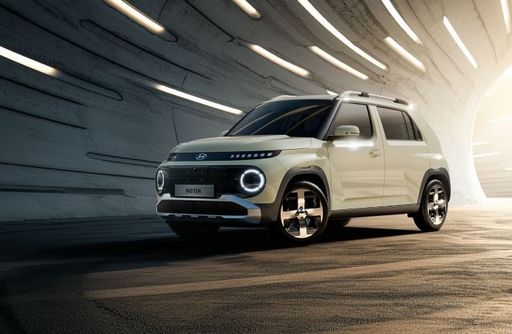 @ Hyundai Motor Company
@ Hyundai Motor Company
Hyundai Inster
Fiat Panda
The Panda is a charming, no-nonsense city companion that mixes cheerful Italian flair with genuinely useful practicality, making tight streets and daily errands feel less of a chore. Its honest simplicity, clever packaging and a dash of cheeky character make it a smart, low-stress buy for people who prefer sensible perks over showroom flash.
details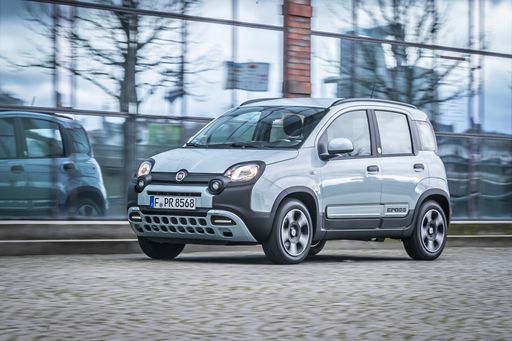 @ Fiat / Stellantis Media
@ Fiat / Stellantis Media
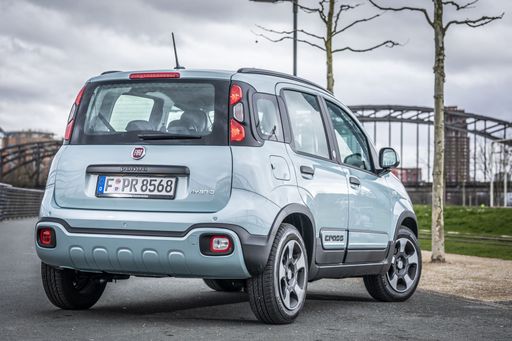 @ Fiat / Stellantis Media
@ Fiat / Stellantis Media
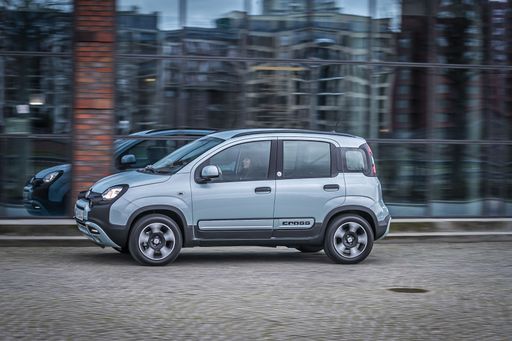 @ Fiat / Stellantis Media
@ Fiat / Stellantis Media
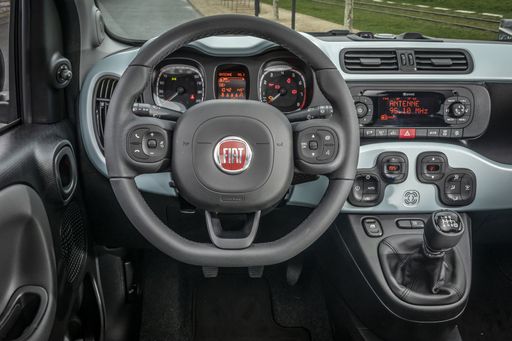 @ Fiat / Stellantis Media
@ Fiat / Stellantis Media
Hyundai Inster
The Inster has quickly captured the attention of automotive enthusiasts with its striking design and dynamic performance. This model seamlessly blends advanced technology with comfort, making it an ideal choice for both daily commutes and adventurous road trips. With its spacious interior and innovative features, the Inster promises an exhilarating driving experience that doesn’t compromise on practicality.
details @ Hyundai Motor Company
@ Hyundai Motor Company
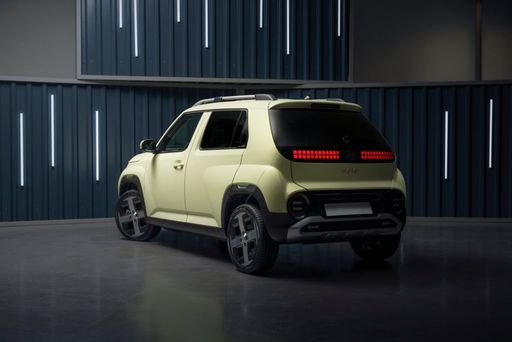 @ Hyundai Motor Company
@ Hyundai Motor Company
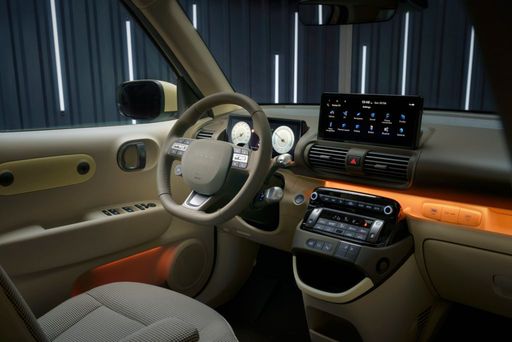 @ Hyundai Motor Company
@ Hyundai Motor Company
 @ Fiat / Stellantis Media
@ Fiat / Stellantis Media
|
 @ Hyundai Motor Company
@ Hyundai Motor Company
|
|
|
|
Costs and Consumption |
|
|---|---|
|
Price
14100 £
|
Price
20500 - 25800 £
|
|
Consumption L/100km
5 L
|
Consumption L/100km
-
|
|
Consumption kWh/100km
-
|
Consumption kWh/100km
14.3 - 15.1 kWh
|
|
Electric Range
-
|
Electric Range
327 - 370 km
|
|
Battery Capacity
-
|
Battery Capacity
42 - 49 kWh
|
|
co2
113 g/km
|
co2
0 g/km
|
|
Fuel tank capacity
38 L
|
Fuel tank capacity
-
|
Dimensions and Body |
|
|---|---|
|
Body Type
Hatchback
|
Body Type
SUV
|
|
Seats
4
|
Seats
4
|
|
Doors
5
|
Doors
5
|
|
Curb weight
1055 kg
|
Curb weight
1380 - 1433 kg
|
|
Trunk capacity
225 L
|
Trunk capacity
238 - 280 L
|
|
Length
3635 mm
|
Length
3825 - 3845 mm
|
|
Width
1643 mm
|
Width
1610 mm
|
|
Height
1551 mm
|
Height
1575 - 1610 mm
|
|
Max trunk capacity
870 L
|
Max trunk capacity
1059 L
|
|
Payload
365 kg
|
Payload
317 - 357 kg
|
Engine and Performance |
|
|---|---|
|
Engine Type
Petrol MHEV
|
Engine Type
Electric
|
|
Transmission
Manuel
|
Transmission
Automatic
|
|
Transmission Detail
Manual Gearbox
|
Transmission Detail
Reduction Gearbox
|
|
Drive Type
Front-Wheel Drive
|
Drive Type
Front-Wheel Drive
|
|
Power HP
70 HP
|
Power HP
97 - 115 HP
|
|
Acceleration 0-100km/h
13.90 s
|
Acceleration 0-100km/h
10.6 - 11.7 s
|
|
Max Speed
164 km/h
|
Max Speed
140 - 150 km/h
|
|
Torque
92 Nm
|
Torque
147 Nm
|
|
Number of Cylinders
3
|
Number of Cylinders
-
|
|
Power kW
51 kW
|
Power kW
71 - 85 kW
|
|
Engine capacity
999 cm3
|
Engine capacity
-
|
General |
|
|---|---|
|
Model Year
2024
|
Model Year
2025
|
|
CO2 Efficiency Class
C
|
CO2 Efficiency Class
A
|
|
Brand
Fiat
|
Brand
Hyundai
|
Is the Fiat Panda offered with different drivetrains?
Available configurations include Front-Wheel Drive.
The prices and data displayed are estimates based on German list prices and may vary by country. This information is not legally binding.
